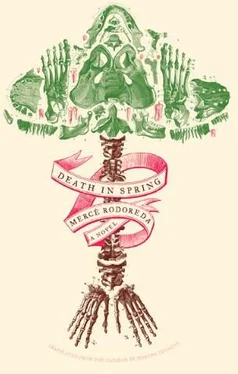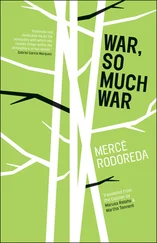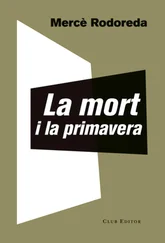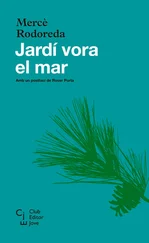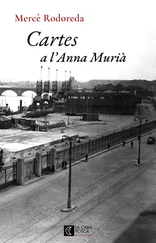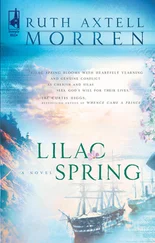We returned to the cave that night. We left the house together and slept there. We cleared a space in the dust, and in our crimson bed sweet sleep enveloped the delicate skin over our eyes. My arm hurt. The blood had formed a scab. With a trace of daylight from the shaft, we made two beds, like two cradles, one beside the other, so we could sleep holding hands. We formed a mountain of dust for a pretend table, and mounds of dust for pretend chairs, and little piles of dust for pretend pots and pans and little cups and round platters.
Every night we would go to the cave. As soon as we woke up, she would tell me what she had seen while she slept. One night a finger of hers turned into a caterpillar, and the tip gave birth to a red butterfly that died almost immediately. Another night she saw bees forming crowns above the horses’ heads, and the horses wore their crowns of bees. Then the bees crowned the old men’s heads, and when the men slaughtered the horses, horses and men were crowned by bees. On another night she saw a stack of horses’ eyes, and the mourners swooped down, snatched them in their beaks, and flew away, high into the sky. When they could fly no higher, they let the eyes fall into the river, and the water carried them away, flowing past the wash area where the women exclaimed, look at the spangles floating in the river. They said the prisoner had hurled them. Then she explained why some soap bubbles turned to glass: the ones that quivered and rose little by little burst, but those that shot straight up, did not.
Inside the well, we found another well. She discovered it. She said she could hear water beneath her and told me to listen. We held our breath. You could hear water flowing, just like I could hear the river from my bed. We stood up but heard nothing; we could only hear it if we were lying down. Stretched out on the ground, she began running her hand across the wall, very slowly. She located an opening in a corner, a long way from where we collected the red powder, and managed to squeeze through it. She crawled inside and returned much later, backing out of the hole. She said she had found a well with light and water flowing through it. The following day, I enlarged the hole with a shovel; every day, bit by bit, I widened it, until we could both go together to see the well and listen to the water.
We would throw red powder in our newly-discovered well and then go down to watch the river: we didn’t know where the water flowing deep inside the well came from or where it was going. We scrutinized the river, searching for a thread of rose-colored water. But the water from the second well dwelt in darkness, and the red powder we threw in it. who knows where it ended up? We threw almost all the powder into the water, all we had piled up when we had enlarged the opening, all that slowly fell from the cave walls from one year to the next, the powder used for painting the village.
We didn’t play in the afternoons. She stayed at home and placed the flowerpot on the windowsill. When the heat grew less poisonous, but still persisted, I took her to the forest of the dead. For a while we strolled from tree to tree, reading the names on the plaques. We found a low fence of thorny branches; the trees on the other side were very old, and on all the plaques, above the names, you could spot a bee flying into a bird’s open beak. We made piles of dry leaves, the ones the wind had left from the previous spring, naked, just veins and nerves.
In the autumn we resumed sleeping in the house; I slept outside her door. If I had trouble falling asleep, from deep inside the cloud that always dwelt within me would loom the unease — of night, faded summer, fled mourners, bees that had transported so much honey. the season that had banished the lingering light and green grass.
One afternoon, returning from the stables with a group of boys, we heard screams. A man thrashing ivy with a cane had fallen, landing face-down in the center of a courtyard, his arm extended. His fall had shattered the ravel of twisted wisteria. They were shouting because he was already dead, and they were still shouting when Senyor arrived in a carriage that was drawn by two grey horses, a crimson-colored glass lamp affixed to each side. The stout, aged driver opened the door and helped Senyor out. I had never been that near him. His twisted legs made it difficult for him to walk. A birth defect: he had come out wrong. The midwife who birthed him had grabbed him by the feet, yanking him out, twisting them. They left him like that, his bones forever contorted.
Between them, two men picked up the crumpled man and placed him in the carriage. Everyone was grumbling because the dead man’s soul had already escaped. Senyor tried to calm them, told them not to worry, he wasn’t fully dead, his soul was still in his mouth. Senyor spoke slowly, in a soft voice, and while he was speaking he glanced about, never blinking. Some believed him because they wished to believe him; others didn’t. One said it would be better to tear down all the ivy, so they would never have to thrash ivy again. A few said if they pulled it all down, the village would be doomed because the ivy kept the summer cool. It swallowed the sun’s strongest rays, rays the naked rock could never absorb. Worse still, the rays would rebound onto the village, making it as hot as the blacksmith’s forge. Senyor kept telling them not to worry. He studied my face for a long time before climbing back into the carriage, where the dead man lay doubled up on the seat. The driver slammed the door with a dry bang, and the carriage pulled away. Bouncing over the round stones, it appeared to be on the verge of falling apart. The pregnant women had removed the bandages from their eyes, to look at Senyor when he descended from the carriage, and when their husbands realized this, they slapped them hard: first one cheek, then the other, one side, then the other. Slap after slap.
For a long time the village talked about the man who had fallen. He had plunged straight down, they said. The cane had slipped from his hand, tumbling down alone, slower than the man, until finally it lodged in the ivy. They talked until the first storm appeared. The horses neighed and tossed their heads, their eyes entranced, fixed, as if glued to a piece of wood. The river coursed by the village, laden with dead branches and leaves from Muntanyes Morades. My stepmother and I went to look at it. Powdery, star-shaped snow fell, and the water near the riverbanks froze. We tramped through snow that squeaked when it turned icy. We moulded mountains with the snow. One day we built a huge snow tree and bored holes in it; we looked at each other through the holes as though we were strangers, and then we laughed. The laugh rippled through the openings and crept into the spiral of our ears and continued for some time, before finally dying deep within our heads. During the snow season, we returned to the forest of the dead.
We came to a halt as soon as we entered: we had never seen it curded with snow. We had gone through the funeral entrance and stood there, holding hands, close to the axe and pitchfork. The trees were white, top to bottom. The trunks wore scabs of snow and ice that a dying ray of sunlight transformed into colors. From the highest branches hung glass twigs, glass stars and threads. The snow had turned to glass, glowing green and blue; a rose color filled our eyes until they almost died. We stayed until we sensed that we too were metamorphosing into trees. We could feel the frost-cold roots being born beneath our feet, growing, binding us to the ground. In the snow our feet were hard to lift; they felt lifeless. Before we crossed the bridge, we looked back, and all the forest was a forest of calm. From time to time snow tumbled from a branch, as though the branch had just taken a deep breath.
Читать дальше
